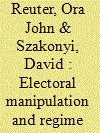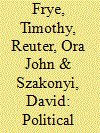| Srl | Item |
| 1 |
ID:
159502


|
|
|
|
|
| Summary/Abstract |
Do businesspeople who win elected office use their positions to help their firms? Business leaders become politicians around the world, yet we know little about whether their commitment to public service trumps their own private interests. Using an original dataset of 2,703 firms in Russia, I employ a regression discontinuity design to identify the causal effect of firm directors winning seats in subnational legislatures from 2004 to 2013. First, having a connection to a winning politician increases a firm’s revenue by 60% and profitability by 15% over a term in office. I then test between different mechanisms, finding that connected firms improve their performance by gaining access to bureaucrats and not by signaling legitimacy to financiers. The value of winning a seat increases in more politically competitive regions but falls markedly when more businesspeople win office in a convocation. Politically connected firms extract fewer benefits when faced with greater competition from other rent-seekers.
|
|
|
|
|
|
|
|
|
|
|
|
|
|
|
|
| 2 |
ID:
178722


|
|
|
|
|
| Summary/Abstract |
Does electoral fraud stabilize authoritarian rule or undermine it? The answer to this question rests in part on how voters evaluate regime candidates who engage in fraud. Using a survey experiment conducted after the 2016 elections in Russia, the authors find that voters withdraw their support from ruling party candidates who commit electoral fraud. This effect is especially large among strong supporters of the regime. Core regime supporters are more likely to have ex ante beliefs that elections are free and fair. Revealing that fraud has occurred significantly reduces their propensity to support the regime. The authors’ findings illustrate that fraud is costly for autocrats not just because it may ignite protest, but also because it can undermine the regime’s core base of electoral support. Because many of its strongest supporters expect free and fair elections, the regime has strong incentives to conceal or otherwise limit its use of electoral fraud.
|
|
|
|
|
|
|
|
|
|
|
|
|
|
|
|
| 3 |
ID:
129981


|
|
|
|
|
| Publication |
2014.
|
| Summary/Abstract |
The authors explore how modern autocrats win elections by inducing employers to mobilize their employees to vote for the regime and thereby subvert the electoral process. using two original surveys of employers and workers conducted around the 2011 parliamentary elections in russia, they find that just under one-quarter of employers engaged in some form of political mobilization. they then develop a simple framework for identifying which firms engage in voter mobilization and which workers are targeted for mobilization. firms that are vulnerable to state pressure-financially dependent firms and those in sectors characterized by asset immobility-are among the most common sites of workplace-based electoral subversion. the authors also find that workers who are especially dependent on their employer are more likely to be targeted for mobilization. By identifying the conditions under which workplace mobilization occurs in authoritarian regimes, the authors contribute to the long-standing debate about the economic bases of democratization. in addition, they explore an understudied means of subverting elections in contemporary autocracies: the use of economic coercion to mobilize voters. Moreover, their research finds that clientelist exchange can thrive in industrial settings and in the absence of deeply embedded political parties.
|
|
|
|
|
|
|
|
|
|
|
|
|
|
|
|